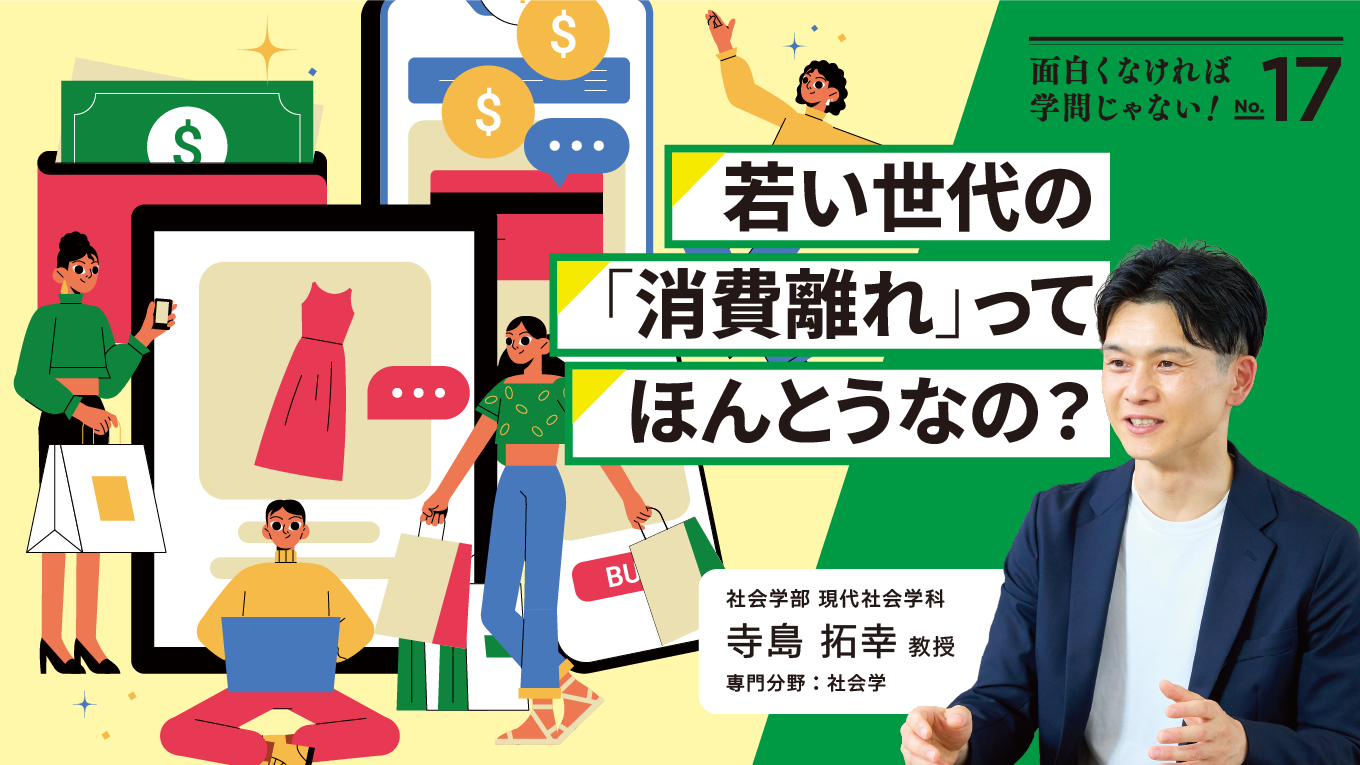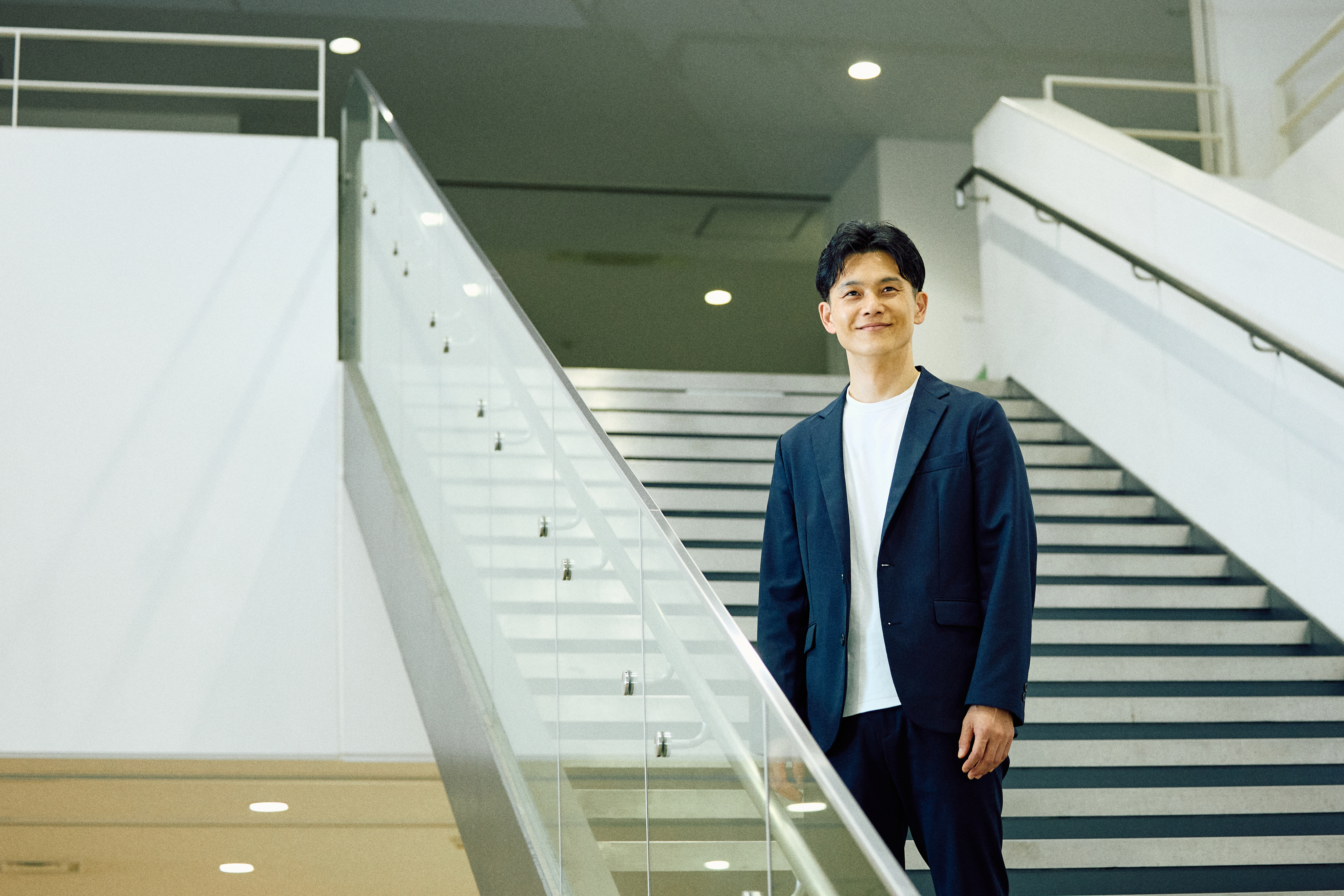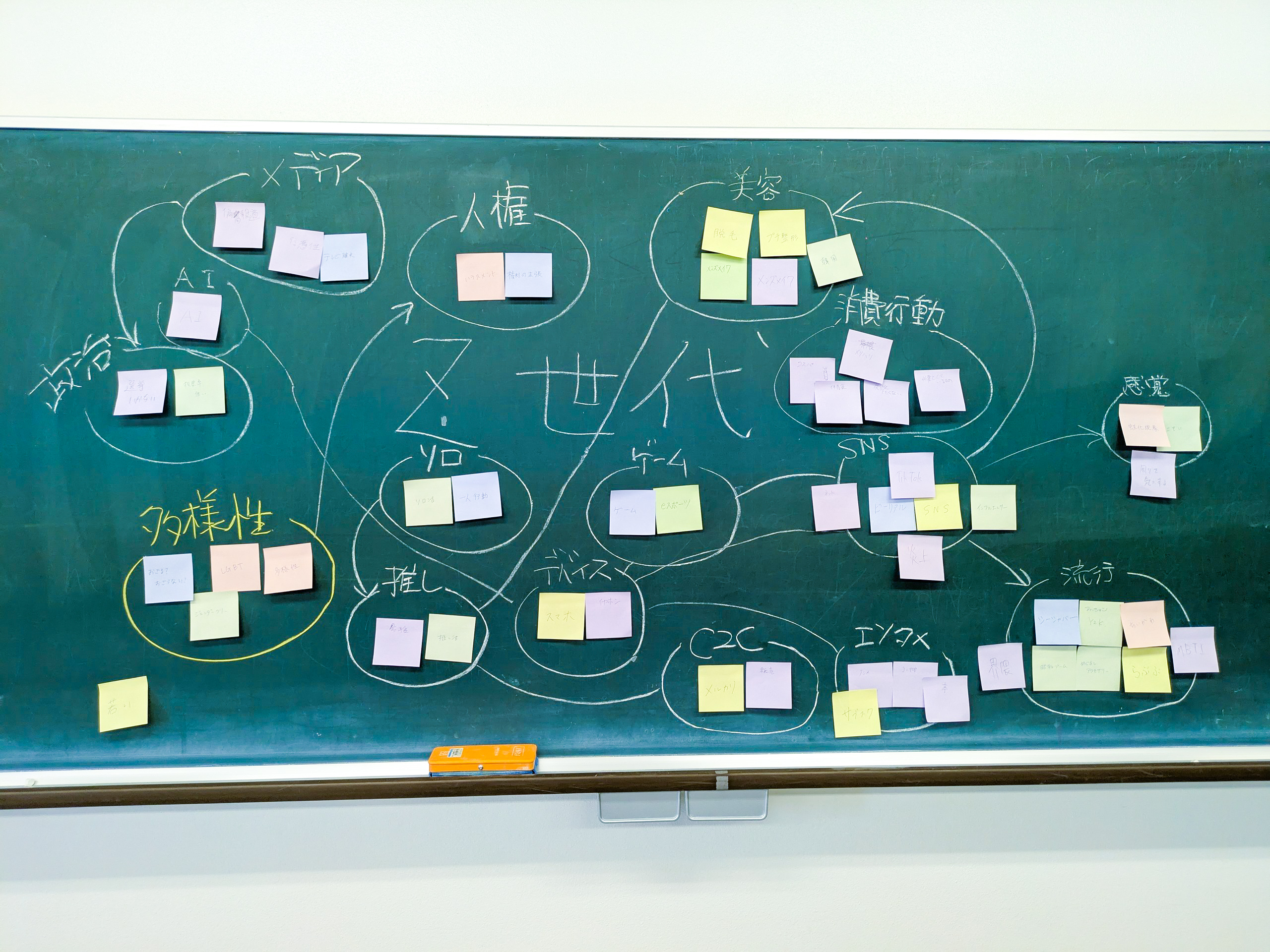
Younger generation
"Abandoning consumption"
Is that true?
"Abandoning consumption"
Is that true?


#Asia University research
Professor Takuyuki Terashima
Faculty of Sociology Department of Contemporary Sociology
2025.10.01
In this series, "If it's not interesting, it's not academia!" we introduce research content and anecdotes of Asia University faculty members. The 17th installment features Professor Takuyuki Terashima of the Department of Contemporary Sociology, Faculty of Sociology.

"I want to know more about real consumers" - From economics to sociology
I am currently a teacher in the Faculty of Sociology, but when I went to university I chose the Faculty Faculty of Economics. However, I didn't enroll because I wanted to study economics. I didn't consider a science or engineering faculty from the start, and when I considered the humanities, I wasn't interested in business, so I didn't choose Faculty of Business Administration or Commerce. Faculty of Law was also out of the question. I thought it might be difficult to find a job in the Faculty of Letters... After thinking about all of this, I decided on Faculty of Economics by a process of elimination, which I'm ashamed to say.
At the time, there were no open campuses or mock classes like there are today at universities, and there was no internet. Having lived in Aomori Prefecture until high school, I didn't really know what I would be able to study at a university in Tokyo.
After entering university, I felt uncomfortable with the stereotypical image of "consumers" that I learned in Lecture like "Microeconomics." However, I found themes like consumer behavior and consumer culture interesting, so I decided I wanted to research more real consumers, and began reading about consumer research in fields other than traditional economics, such as consumer society theory, consumer psychology, and behavioral economics.
Now, I belong to the so-called "employment ice age" generation. It's true that my job hunt didn't go well at all. But I had research to do. I studied Faculty of Economics as an undergraduate, but I knew that what I wanted to do was consumer sociology, so I decided to go on to Graduate School in research, where there were experts in that field. As a result, I became completely absorbed in research during my master's program, and before I knew it, I had progressed all the way to a doctoral program.
How has "digitalization" changed consumer culture and behavior?

In Graduate School, I was trained not only in the research of consumer sociology, but also in social research, which is essential for the research of sociology, through practice. At that time, it was not an Internet survey, but a door-to-door survey. Moreover, Graduate School teachers were entrusted with a large-scale survey of thousands of people. The work of organizing a large number of student staff and managing the survey was a series of difficulties both physically and mentally. However, the joy of finally gathering and aggregating the data was enormous, and I felt a sense of satisfaction that I had never experienced before. Since then, I think I've focused on using data to reflect a lot of "people's voices" in research.
I am currently working on a research based on social research on how various trends in modern society are affecting consumer society and consumer behavior. The trends mentioned here are "globalization", "digitalization", and "increasing environmental (eco) awareness". Generational and gender differences are also important factors. Japan With the funds of the Japan Society for the Promotion of Science (JSPS) and the Ministry of Education, Culture, Sports, Science and Technology (Grants-in-Aid for Scientific research (Grants-in-Aid for Scientific Research), we are particularly focused on research on changes in consumer culture due to digitalization.
In this research, the main pillars of this book are "the sense of ownership of things and materialism (about material desires, possessiveness, etc.)", "consumer identity formation and explicit consumption (for example, wanting everyone to see their possessions), symbolic consumption (obsession with brands and statuses), and "prosumers", which have been emphasized in conventional consumer sociology research.
Of these, "prosumer" may need special explanation. This is a coined word that combines "Producer = producer" and "consumer = consumer", and in a word, it means "consumer who can also be a producer". You may think, "What is that?", but in fact, it is very familiar to young people. Currently, there is a huge amount of products = content created by ordinary users on the web. In other words, popular YouTubers and SNS influencers are admirable "prosumers". Or you can use a 3D printer to make a fairly high-quality product yourself. In this era, how the awareness of the younger generation of digital natives about consumption is changing (or not) is a major area of interest for me, and I am trying to explore it empirically through large-scale web surveys.
I am currently working on a research based on social research on how various trends in modern society are affecting consumer society and consumer behavior. The trends mentioned here are "globalization", "digitalization", and "increasing environmental (eco) awareness". Generational and gender differences are also important factors. Japan With the funds of the Japan Society for the Promotion of Science (JSPS) and the Ministry of Education, Culture, Sports, Science and Technology (Grants-in-Aid for Scientific research (Grants-in-Aid for Scientific Research), we are particularly focused on research on changes in consumer culture due to digitalization.
In this research, the main pillars of this book are "the sense of ownership of things and materialism (about material desires, possessiveness, etc.)", "consumer identity formation and explicit consumption (for example, wanting everyone to see their possessions), symbolic consumption (obsession with brands and statuses), and "prosumers", which have been emphasized in conventional consumer sociology research.
Of these, "prosumer" may need special explanation. This is a coined word that combines "Producer = producer" and "consumer = consumer", and in a word, it means "consumer who can also be a producer". You may think, "What is that?", but in fact, it is very familiar to young people. Currently, there is a huge amount of products = content created by ordinary users on the web. In other words, popular YouTubers and SNS influencers are admirable "prosumers". Or you can use a 3D printer to make a fairly high-quality product yourself. In this era, how the awareness of the younger generation of digital natives about consumption is changing (or not) is a major area of interest for me, and I am trying to explore it empirically through large-scale web surveys.
Thoroughly conducted social survey data overturns easy preconceptions

As I have continued to collect and examine data on consumer culture in the digital society, facts have emerged one after another that have greatly betrayed my initial assumptions. Compared to when I was a student, the trend in consumer culture is said to be a shift from "mono-consumption," in which people own things, to "koto-consumption," in which people focus on experiences. Recently, we often hear words like "young people are losing their appetite for consumption" and "materialistic consumption is declining. I myself had this preconceived notion that young people these days are not very attached to things. ...... However, when I actually analyzed the data, I found that "the materialistic desires of the younger generation, who are not supposed to be obsessed with things, may actually be essentially the same as those of my generation when we were young people." This is what we came to see. I also began to wonder if there is a transformation in consumer culture that is difficult to see if we focus only on "digitalization" (......). The keyword that emerged was "individualization." During the "period of rapid economic growth" from the 1960s onward, Japanese people had a common goal (model) to have a family, buy a car and a house when their salary increased, and enjoy a rich consumer culture life. However, with the aging of the population and the increase in the number of single-person households, such "my home fantasy" has become rare. Analyzing the data, it seems that the consumer culture of the current era is moving in the direction of "self" through hobbies and passions. Behaviors such as "social networking" and "guess what" may be one of the manifestations of this trend. We would like to conduct a new social survey this year (2025) to determine the current state of consumer culture.
research In some respects, it is interesting to see how one's initial expectations can be contradicted in this way. It is precisely because our preconceptions are overturned that we gain new perspectives that enable us to look at society more broadly.
research In some respects, it is interesting to see how one's initial expectations can be contradicted in this way. It is precisely because our preconceptions are overturned that we gain new perspectives that enable us to look at society more broadly.
What I learned from students at Asia University

This year, I became a faculty member at Asia University Department of Sociology. As research in the sociology of consumption, I feel extremely fortunate to be in an environment at a university where I can interact with young digital natives on a daily basis. I am able to hear firsthand how consumer culture, such as "looking good on social media" and "supporting one's favorite idol," is alive and well in their lives, something that didn't exist when I was young.
I have taught at several universities, but my impression of Asia University students is that they are energetic and cheerful, and I find classes enjoyable. They are very interested in what I have to say in class and seminars, and I learn a lot from their unique student perspectives.
"Isn't it actually a misconception of middle-aged and older generations that younger generations are particular about style and cost-effectiveness?" "I think the media's categorization of Generation Z is pretty arbitrary"... Hearing students' comments like these made me realize once again that we shouldn't look at society or people with preconceived notions. I would like to continue to enjoy research changes in consumer culture and lifestyles, inspired by my students.
Finally, I would like to say to current students, prospective university students, and high school students about to enter university: "Think about how you want to live your life at university." While it is important to acquire knowledge and skills that will be useful in society, I would like each and every student to take the time during their university life to seriously consider their own long-term lifestyle. I chose my university department by a process of elimination, but through the academic studies I encountered and the interactions I had with my mentors, seniors, and peers, my life's path and direction gradually became clear, leading me to where I am today. However, such trial and error and time for careful consideration are only available during student life. I hope that you will spend your four meaningful years at university in order to determine your own path in life.
I have taught at several universities, but my impression of Asia University students is that they are energetic and cheerful, and I find classes enjoyable. They are very interested in what I have to say in class and seminars, and I learn a lot from their unique student perspectives.
"Isn't it actually a misconception of middle-aged and older generations that younger generations are particular about style and cost-effectiveness?" "I think the media's categorization of Generation Z is pretty arbitrary"... Hearing students' comments like these made me realize once again that we shouldn't look at society or people with preconceived notions. I would like to continue to enjoy research changes in consumer culture and lifestyles, inspired by my students.
Finally, I would like to say to current students, prospective university students, and high school students about to enter university: "Think about how you want to live your life at university." While it is important to acquire knowledge and skills that will be useful in society, I would like each and every student to take the time during their university life to seriously consider their own long-term lifestyle. I chose my university department by a process of elimination, but through the academic studies I encountered and the interactions I had with my mentors, seniors, and peers, my life's path and direction gradually became clear, leading me to where I am today. However, such trial and error and time for careful consideration are only available during student life. I hope that you will spend your four meaningful years at university in order to determine your own path in life.